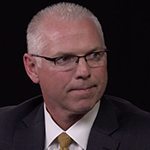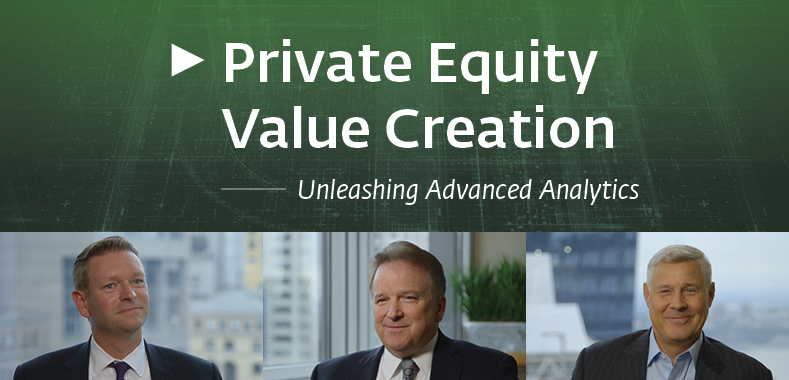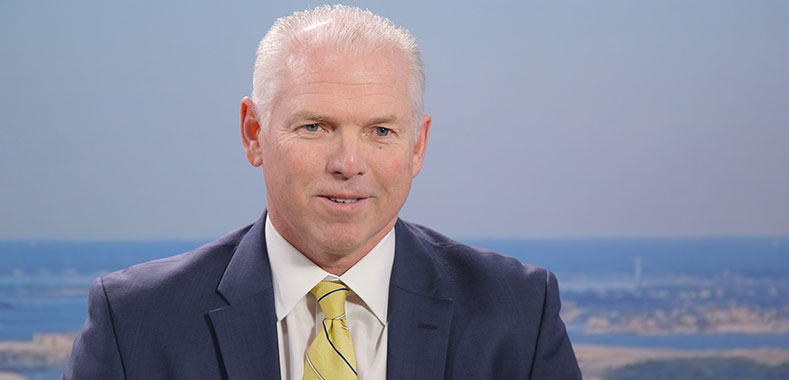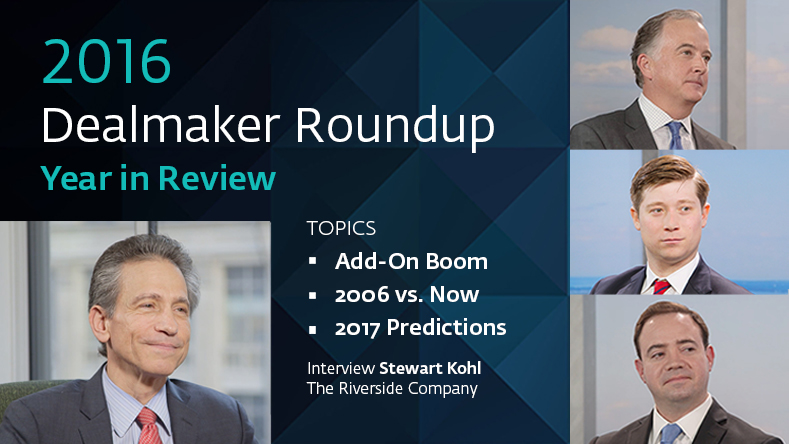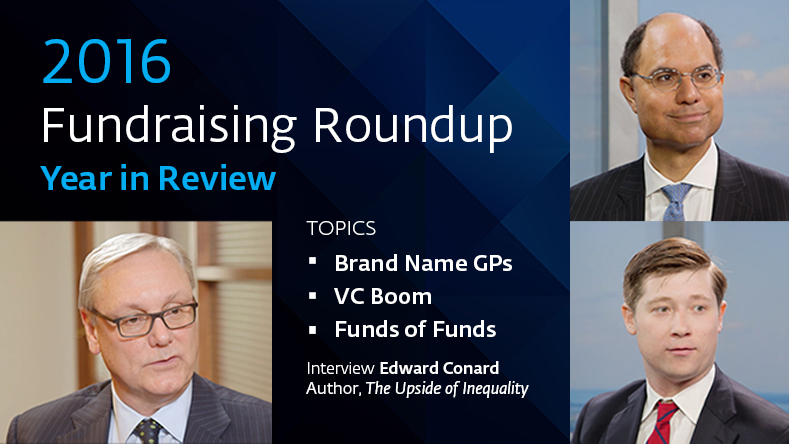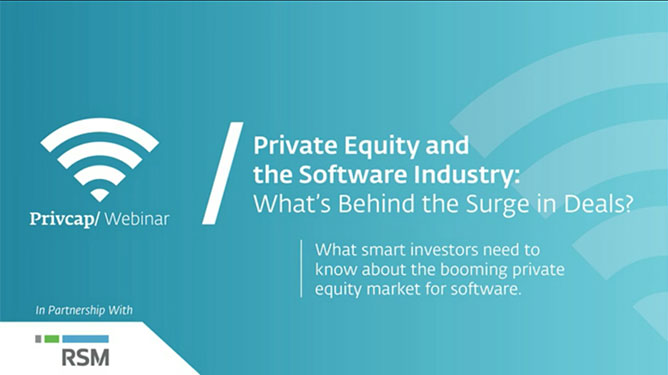‘Need to Know’ is the New ‘Nice to Know’
With access to incredible data analysis tools, the CFO has become a key player in private equity value creation. Three private equity experts argue for the centrality of the CFO and finance team in the operational improvement of portfolio companies.
Transcript Download Transcript
“Need to Know” Is the New “Nice to Know”
The Data-Driven CFO
David Snow, Privcap:
Today, we’re joined by Shahriyar Rahmati of Comvest Partners, Dave Noonan of RSM and Kevin Masse of TA Associates. Gentlemen, welcome to Privcap. Thanks for being here.
Unison: Thanks for having us.
Snow: We’re going to have a conversation about the important role the CFO plays in the value-creation process in private equity portfolio companies. In particular, we’re going to look at the power of data and the ability for CFOs and the finance function to tap into these incredible new data and tech platforms to really be able to make better decisions as they attempt to grow their companies. Starting with you, Kevin, talk about how the role of the CFO has evolved and…how the ability of that CFO to tap into new tech platforms has changed their ability to add value.
Kevin Masse, TA Associates:
We view one of the core foundational pieces to really driving growth in our companies is the CFO role. I’ve seen it evolve from more of a traditional, rear-view mirror support function to a role where we’re enabling the rest of the organization to really drive performance and execute on the strategic plans for the business. And that’s been a huge pivot over the last 10 or 15 years.
I think that pivot is also correlated quite a bit with the ability of technology that’s available now to CFOs to really support operations of the business. So, when I think about the combination of more forward-looking analysis coupled with the availability of technology that really enables that type of capability and report out by our CFOs, that role has become integral to the success of our companies.
Dave Noonan, RSM US LLP:
The CFO is becoming more strategic and they’re more savvy as well. They have to be to survive in this environment. What we’ve seen recently is a proliferation of a lot of very sophisticated tools from corporate performance management to business intelligence and even tools to help with little things like consolidations and closed process management that really take a lot of time and energy to get through. I think those technologies are being driven by the sophistication of the CFOs and there’s just a need for data that they require in that role.
Shahriyar Rahmati, Comvest Partners:
The quarterback of the portfolio company in a lot of ways is the CFO. They don’t have a dog in the hunt from a functional perspective, they’re the eyes and ears of the CEO and, in a lot of cases, executing major elements of the strategic planner thesis. The organizations often have lots of data, right? It’s just information systems, whether they’re payroll or ERP or CRM systems—they spit out data all over the place.
So, the question is: is there somebody sitting in the middle of that data who understands the business, understands what everybody is trying to get done, can think about it in a rigorous, quantitative, organized way and then really drive it using some of the readily available technologies out there?
Masse: The other thing that’s changed quite a bit is everything that we’re describing used to be almost aspiration at one point for CFOs. Today, it’s table stakes. When I think of our expectations as board members and when I partner with our CEOs in terms of what their expectations are from the finance function, everything we’re talking about now isn’t even, “I hope we can have this.” It’s, “If I don’t have it now, get it for me.” It’s become very much now part of standard operating procedure.
Snow: Can you give an example of a field of data or a type of function where, again, it’s now table stakes compared to aspirational?
Masse: Think of the solutions that are available today to talk about and focus on utilization, employee engagement and retention. All of those functions now are critical because attrition is a huge cost for our businesses. So, often, the HR function is partnering with the finance function to ensure that data is available for senior leadership. Again, the finance function is generally at the tip of the spear on a lot of that analysis.
Rahmati: Ability to understand healthcare costs and the realm of insurance, for example, has moved from another line in the P&L that, yeah, we used to focus on and care about. But actually, today, that 6% to 8% or 10% compounded annual growth rate—the things you do around how you change plan designs without creating uncompetitive or challenging environments for your workforce because you need to attract and retain and recruit people.
Snow: All three of you work with and invest in growth-stage companies that go through different stages as they get bigger and bigger. And, as they get bigger and bigger, they encounter certain pain points. How does the role of the CFO and the need for data from the CFO change as they go from an earlier-stage company to a later-stage company?
Rahmati: You go from sometimes basic headlights and the ability to define where the brick walls are right in front of you. When you are at an early-stage pace, there are things that show up when the water level is low that you may not care about quite as much or focus on as much as the business scales. The whole notion of scalability itself is a concept that can be challenging for businesses in the earlier phase of their lifecycle to get, especially if we perform a buy-and-build strategy is thinking about how you build core scalable, internal both G&A measurement processes, etc. Thinking about the $500-million or billion business, not necessarily the $50 to $100-million business, which I think our general sphere is on the lower end of what we look at.
Noonan: I’ve seen businesses transition from small to large or vice versa. A lot of times in carve-outs and divestitures, you’ll have a corporate controller that was part of a $5-billion company and now, all of a sudden, he’s the CFO of a $100-million manufacturing firm. From a technology perspective, I think it’s almost easier to size for scale in that environment than it is from the human capital side. I’ve seen more obsolescence businesses grown with the finance individual—the CFOs themselves—that can take it to a certain point, but then, a different skill set is required to move the business to the next level or to take it to an IPO or an exit.
Masse: Earlier stage, you’re focused on those levers around growth. How do you scale that business from a revenue perspective? As you start to go through that maturation process, now it’s profitable growth and how do you sustain not only revenue growth, but also the profits that you’re aiming to drive in the business? We see the finance function—what I was alluding to earlier—really being an integral part of the story around how does management make very much informed decisions? It’s just not around Opex. It’s on the sales team. Where do you deploy resources? How do you evaluate overall effectiveness of your team?
Rahmati: It almost has to be the CFO really, because your sales teams don’t typically run out there and evaluate themselves rigorously on the profitability of the last customer that they acquired.
Masse: When I reflect on some of our smaller portfolio companies and the requirements from a people perspective and system perspective around the finance function, it’s fairly traditional, right? Let’s get a CFO in place. Let’s make sure we’ve got a world-class ERP system that can scale with the business. When I compare that to some of our larger companies, when I look at the resources that reside within the finance function, it’s beyond the accounting team. It’s what we used to call FP&A. Now they’re calling themselves data scientists, data ninjas. We have CFOs who have considered themselves data ninjas.
The reason for that is, again, all of this data—they’re sitting at the nexus of all these different points of information. Pulling it together, analyzing it and then teasing out the key takeaways so that the rest of the management team could be more productive and impactful to the business—that’s where I’m seeing the CFO roles certainly evolving, too. It’s already happened, which is frankly driving a ton of performance.
